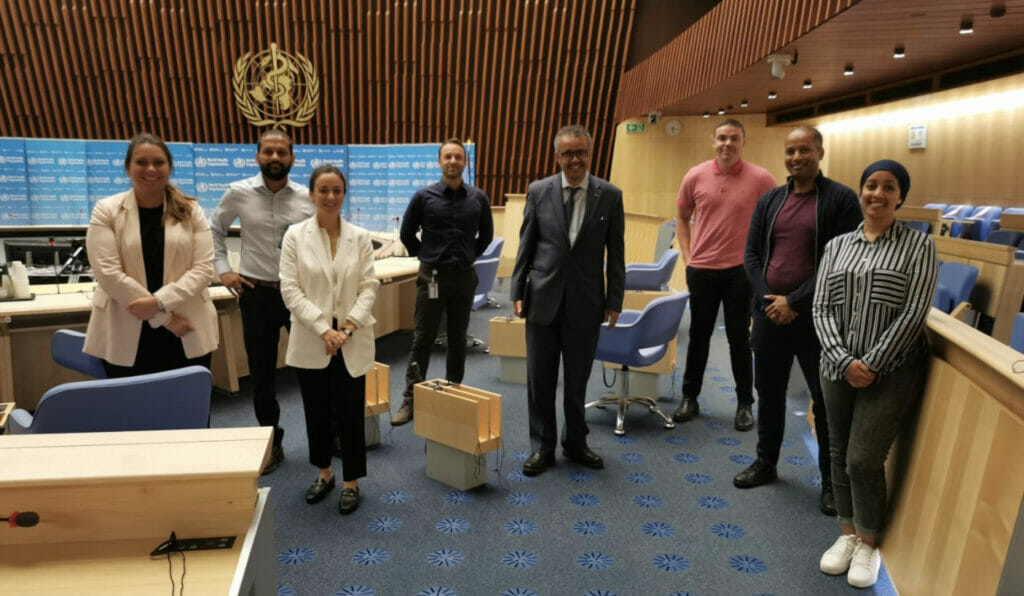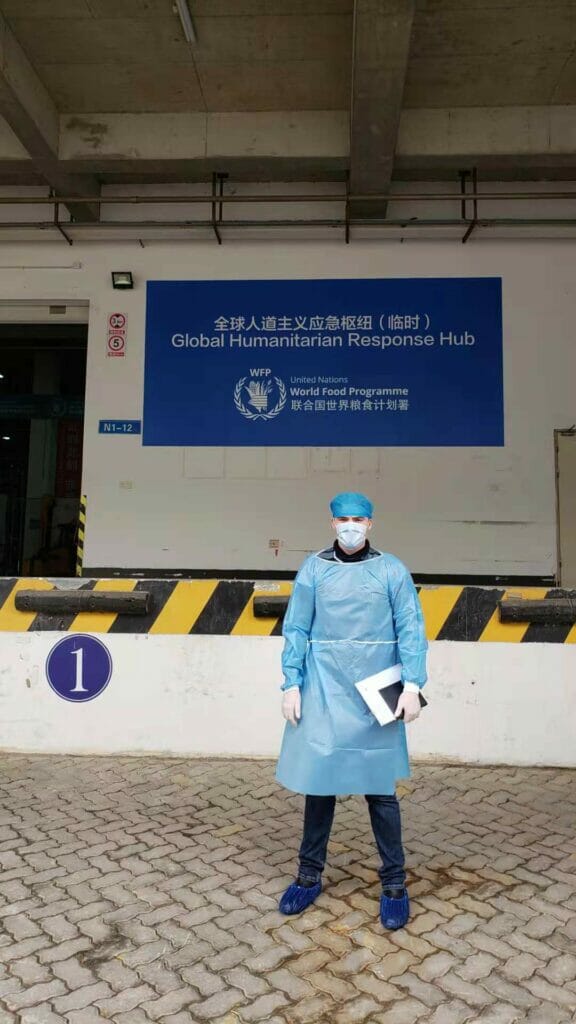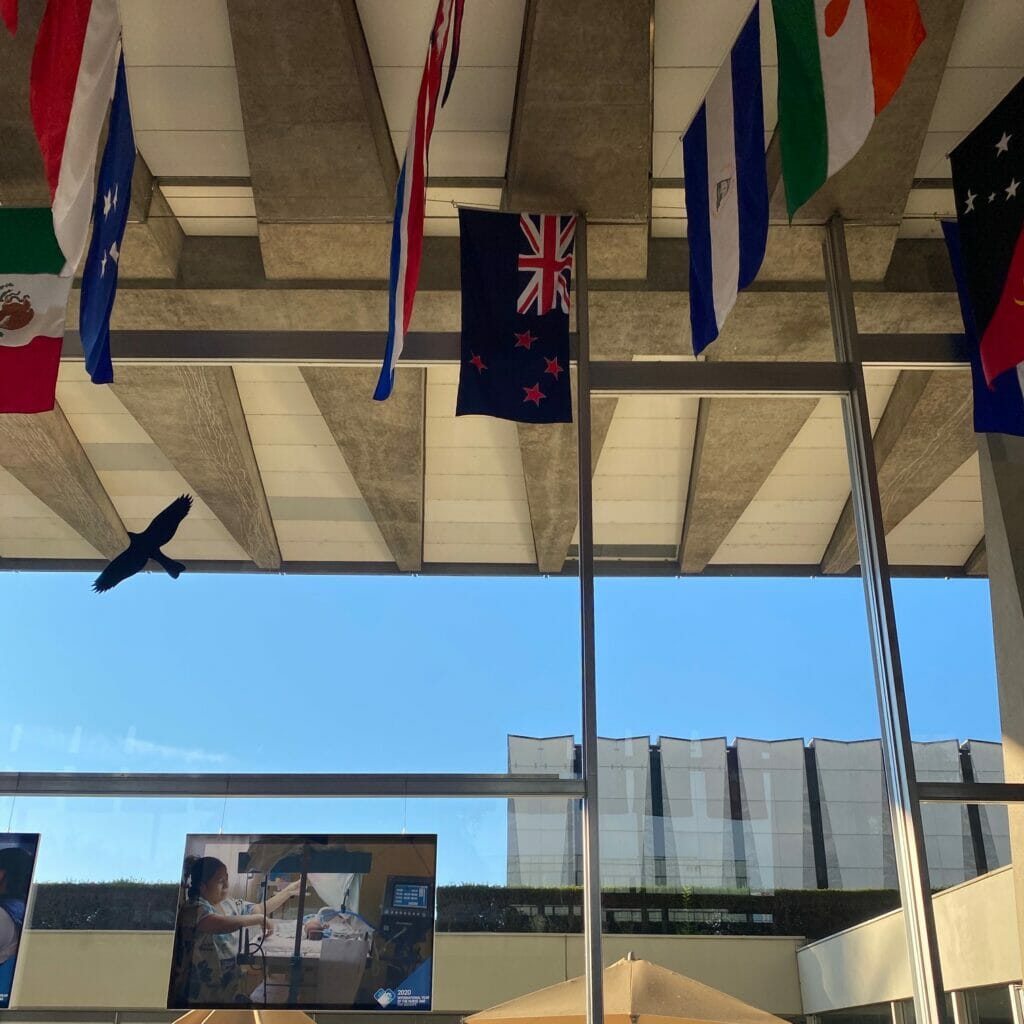
Can you talk to your career background?
After a short career as a chef, working in a variety of restaurants around the world, I embarked on a career change in my mid-twenties and undertook a Bachelor of Commerce at Lincoln University, majoring in Supply Chain Management. It was a program that gave me a much wider perspective on life, business, and how interconnected we all are in the world. Soon after graduating I obtained a position in New York City, with an international freight forwarder. This was a good introduction into the world of the supply chain, learning how the international transportation sector operates, and living in a city which had been a childhood ambition. After a couple of years, an opportunity arose to work in Washington DC, as part of the United States Agency of International Development global health supply chain mechanism. This position involved the movement of lifesaving commodities worldwide on behalf of the U.S Government to fight HIV/AIDS, Malaria, and other infectious diseases. In taking on this role, I found a subset of the supply chain industry about which I became extremely passionate.
In early 2020, after some visa difficulties requiring me to leave the US for a certain period of time, I chose to take a break and go travelling. As COVID-19 set in, I returned to New Zealand to assess the next step. Soon after, I joined the United Nations World Food Programme, as a supply chain planning and optimization consultant and was stationed in the World Health Organization Headquarters in Geneva, working on the Humanitarian Community’s response to COVID-19.
What has your role been during the Pandemic?

In 2020, the World Food Programme was assigned as a lead agency on the United Nations COVID-19 Global Humanitarian Response Plan. WFP took on a leading role in ensuring transportation lanes remained open so passengers and lifesaving cargo could continue to be moved across the world, as the world shut down due to COVID-19 restrictions. My specific role was on the cargo side, where I worked to ensure the quick flow of cargo throughout the world on behalf of partners such as WHO, UNICEF, Medecins Sans Frontieres (Doctors without Borders) etc. to protect healthcare workers, ensure people did not go off treatment and to help stand up vaccination programs, which would have otherwise been impacted.
Key aspects of my role included managing partners’ accounts, optimizing systems and processes and driving continuous improvement across operations. Later on, in 2020, I joined WHO via a WFP secondment and took on a new role as a Vaccine Logistics Officer. The new position is focused on helping WHO set up COVID-19 vaccine clinical trials around the world, where the resulting data will ultimately power future decision-making for global humanitarian initiatives such as COVAX and WHO emergency approvals and authorizations. This has been a wide-ranging role that has included the full spectrum of supply chain management; from commodity procurement through to the delivery of goods to countries.
What are the challenges of working at a global, cross-border level?
The onset of COVID-19 was a difficult period globally, in ensuring safe passage of passengers and lifesaving cargo across borders. Borders shut down and countries were closed to the outside world in fear that the virus would become established. To mitigate this impact; during the early stages of COVID-19, the World Food Programme did an exceptional job in establishing air lanes to open up safe passages via standing up a humanitarian flight network, complemented by existing UNHAS operations. As the private sector became operational again and in many cases, reinventing itself by not being so reliant on traditional income streams; it became easier to ensure the safe passage and cost-efficiency of passengers and cargo.
Weak health systems remain a large challenge at the global cross-border level. From a COVID-19 context, many countries around the world did not have the luxury of robust testing at the beginning of the COVID-19 Pandemic and many still don’t, consequently making it difficult to detect and isolate the virus during the inbound trade and passenger flows across borders. Combined with people fleeing violence, global food insecurity, shifting populations and a number of deadly diseases that cross borders; there are many challenges we currently face, to ensure a healthier and safer future going forward.
How do we ensure that aid/vaccines are delivered to vulnerable countries when there is so much demand currently from the developed countries?
The success so far of the COVAX facility has been pleasing. As part of the wider WHO-led COVID-19 Tools (ACT) Accelerator; seeing the various humanitarian agencies, donors, and countries come together, placing their differences to one side, and funding and executing a global initiative to protect the world’s most vulnerable nations, has been key so far in mitigating the impact of vaccine nationalism. But there is still so much that can be done, as the WHO Director-General Dr. Tedros Adhanom Ghebreyesus often repeats, “No-one is safe until everyone is safe.”
It is crucial that as an international community we work together, share resources and help nations protect their people and strengthen their health systems so that we can come out the other end of COVID-19 as a safer world. I have watched with interest, the private sector, where some organizations have been sharing their expertise, intellectual property and manufacturing capacity to help increase COVID-19 vaccine production and thus ensure equitable access. These relationships have set the benchmark, and I am hopeful other organizations will follow their lead.
Have you noticed an increase in protectionism in developed countries over the past year?
It is only natural for nations to want to protect their own. Throughout history, time and time again, we have seen that when we work together as a collective, we achieve much better outcomes. So far, we have seen a handful of organizations and countries take the lead on sharing intellectual property and production capacity with the outside world, in the fight against COVID-19. This is admirable and sets the standard and hopefully, others will follow especially as more regulatory approvals come through on tools such as vaccines and therapeutics. I am confident we will see more private sector actors put their hands up in helping to fight COVID-19.
It will also be key that we build on the lessons learned and make use of the infrastructures established from COVID-19, as we still have other massive challenges facing the world, such as HIV/AIDS, Malaria and Ebola on the health side, as well as alarming levels of global food insecurity with a number of nations teetering on famine.
What lessons do you believe have been learned through Covid for those working in supply chain/logistics in the humanitarian sector?
During COVID-19, the humanitarian sector had a massive wake-up call on supply chain and logistics. At the forefront is the need to diversify procurement mechanisms and ensure multiple coverage levels in areas such as contracting manufacturing/transport and logistics services, in moving forward. Too often during COVID-19, we saw well-known organizations fail to live up to contractual agreements and follow the money or provide a diminished service. As a humanitarian community, we need to do a better job at monitoring the entire supply chain; from knowing where raw materials come from, to market analysis through to what is happening at the last mile in countries. Assuming we can continue to bring these segments of the supply chain together, the data collected will allow us to make better decisions and respond quickly to future emergencies.
Another key lesson that has come out of COVID-19 for humanitarian supply chains is maintaining and investing in a strong workforce. Agencies are often chronically underfunded and cannot match the private sector from a monetary aspect – but we need to do a better job at being able to keep team members and ensure they are looked after, developing their careers and being challenged; while maintaining an acceptable work-life balance. Burn out can happen very easily in the humanitarian sector given the emotional toll the work can have on one’s wellbeing.
In what ways do you think the past year has altered the world’s perception of New Zealand?

I feel New Zealand’s leadership throughout the COVID-19 Pandemic has been a beacon of hope for many people globally. Through following the science, being empathetic and championing kindness, the New Zealand Government, and Team NZ have led from the front and driven one of the best COVID-19 responses in the world. It is easy to say we have a small population, closed our borders quickly, good health care etc., but it is a very difficult task to execute a robust public health response the way New Zealand has, while keeping the public on-side. We still have a long way to go and only need to scratch the surface to see that New Zealand has no shortage of challenges and leads the world in some alarming statistics. We need to respond to these challenges, the same way we did with COVID-19 – set the benchmark in implementing positive change and work towards achieving the UN Sustainable Development Goals to ensure an adequate quality of life for all New Zealanders.
Is there a particular Kiwi connection that has amplified your career in some way?
Yes, an alumni connection from Lincoln University – Michael Aldwell who helped me get my first start in New York, then remained a close mentor throughout my time there. We built on this relationship and brought over many young Kiwis into roles with the company in the years that followed. Michael’s dad, Patrick Aldwell, has also been an incredible supporter and has made a huge impact on many young New Zealanders’ lives.
When in Washington, D.C, a tight knit Kiwi community often got together and supported each other. People who stood out include Kate Brown and Michael Fleming, both leaders in their fields and two of the most caring and kind people I have had the pleasure of meeting.
In Geneva, I am lucky to have Vanessa Cramond as a colleague and friend at the World Health Organization, a humanitarian nurse who has worked in some of the world’s toughest locations with Medecins Sans Frontieres.
What have you been the most proud of this past year?
Reflecting on 2020, perhaps the proudest moment was what we achieved at the World Food Programme in establishing an air network to ensure the smooth flow of passengers and lifesaving cargo as traditional providers went down or focused their interests elsewhere. Through working closely with partners and sharing resources, we opened up a humanitarian transport network that reached almost all countries in the world with lifesaving cargo. Building a functional global health supply chain from scratch can take years. In this case however, within months, we had brought together a team of global experts and contractors that provided a mechanism to move cargo quickly and thus ease global suffering.
On a personal note, working for both the WFP and WHO was an ambition dear to my heart. To bring agencies closer together and share expertise to combat global suffering enables us to learn so much from each other.
What are you hopeful for in 2021?
In 2021, universal healthcare remains a priority. I am hopeful we continue to make strong strides worldwide towards ending COVID-19 and ensuring global, equitable access to COVID-19 immunization. If we can build on the success of the COVID-19 vaccine technology we may further progress towards developing a vaccine against HIV/AIDS and other deadly infectious diseases. In parallel, we must continue to work on the other great challenges facing much of the world, such as securing global food security and defeating global hunger.
HOW KEA CAN HELP
Join
Join the Kea community, and stay connected to New Zealand, its people and businesses wherever you are in the world.
Kea Connect
Help Kiwi businesses explore their global potential through our worldwide community.

 MENU
MENU






